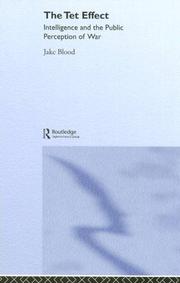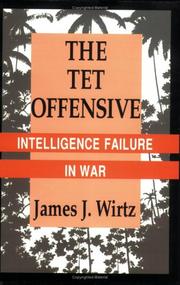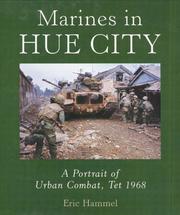| Listing 1 - 10 of 10 |
Sort by
|
Book
Year: 1968 Publisher: Paris : Denoël,
Abstract | Keywords | Export | Availability | Bookmark
 Loading...
Loading...Choose an application
- Reference Manager
- EndNote
- RefWorks (Direct export to RefWorks)
Book
Abstract | Keywords | Export | Availability | Bookmark
 Loading...
Loading...Choose an application
- Reference Manager
- EndNote
- RefWorks (Direct export to RefWorks)

ISBN: 1134270240 1280281952 9786610281954 0203339819 9780203339817 6610281955 0415349974 9780415349970 9781134270248 9781134270194 1134270194 9781134270231 1134270232 9780415652261 041565226X 9781280281952 Year: 2005 Publisher: London ; New York : Routledge,
Abstract | Keywords | Export | Availability | Bookmark
 Loading...
Loading...Choose an application
- Reference Manager
- EndNote
- RefWorks (Direct export to RefWorks)
A close examination of the role of intelligence in shaping America's perception of the Vietnam War, looking closely at the intelligence leadership and decision process. In 1967, intelligence was called upon to bolster support for the Vietnam War and allowed America's leaders to portray a 'bankrupt' enemy ready to quit the battlefield. The audacious Tet Offensive of 1968 shattered this image and although it ended with an American military victory, it is remembered as the juncture when American support turned against the war. Public opinion on the war was a primary concern for the John
Tet Offensive, 1968. --- Vietnam War, 1961-1975 --- Viet Cong Tet Offensive, 1968 --- Campaigns. --- Campaigns
Book
ISBN: 1283925354 1574414607 9781574414608 1574414526 9781574414523 9781574414523 Year: 2012 Publisher: Denton, Tex. : University of North Texas Press,
Abstract | Keywords | Export | Availability | Bookmark
 Loading...
Loading...Choose an application
- Reference Manager
- EndNote
- RefWorks (Direct export to RefWorks)
In early February of 1968, at the beginning of the Tet Offensive, Private First Class Gregory V. Short arrived in Vietnam as an eighteen-year-old U.S. Marine beginning his tour of duty as an 81mm mortarman at Con Thien near the DMZ. Soon thereafter Short left his mortar crew and became an 81mm's Forward Observer working with the U.S. Army's 1st Air Cavalry Division and other units to relieve the siege at Khe Sanh by reopening Route 9. By September Short was transferred to the 1st Battalion 9th Marines (the Walking Dead). Assigned as an infantryman (grunt) and operating along the DMZ and near t
Tet Offensive, 1968 --- Vietnam War, 1961-1975 --- Viet Cong Tet Offensive, 1968 --- Veterans --- Campaigns --- Short, Gregory V., --- United States. --- U.S. Marine Corps --- United States Marine Corps --- USMC --- Vietnam (Republic) --- History. --- USMC (United States Marine Corps)

ISBN: 1501713353 1501713361 9781501713361 0801424860 9780801424861 9781501713354 0801482097 Year: 2017 Publisher: Ithaca, N.Y. : Cornell University Press,
Abstract | Keywords | Export | Availability | Bookmark
 Loading...
Loading...Choose an application
- Reference Manager
- EndNote
- RefWorks (Direct export to RefWorks)
In this account of one of the worst intelligence failures in Americanhistory, James J. Wirtz explains why U.S. forces were surprised by the North Vietnamese Tet Offensive in 1968. Wirtz reconstructs the turning point of the Vietnam War in unprecedented detail. Drawing upon Vietcong and recently declassified U.S. sources, he is able to trace the strategy and unfolding of the Tet campaign as well as the U.S. response.
Vietnam War, 1961-1975 --- Tet Offensive, 1968. --- Vietnam Conflict, 1961-1975 --- Vietnamese Conflict, 1961-1975 --- Vietnamese War, 1961-1975 --- Viet Cong Tet Offensive, 1968 --- Military intelligence. --- Campaigns --- Tet Offensive, 1968 --- 842.1 Propaganda --- 850 Vrede- en conflictstudies --- 855.4 Militaire interventies --- 876.1 Defensie --- 876.2 Inlichtingendienst --- 876 Veiligheidspolitiek --- 882.4 Noord-Amerika --- 883.3 Zuidoost-Azië --- 883 Azië --- Military intelligence

ISBN: 1890988782 9781890988784 9780760325216 Year: 2015 Publisher: Pacifica, California : Pacifica Military History,
Abstract | Keywords | Export | Availability | Bookmark
 Loading...
Loading...Choose an application
- Reference Manager
- EndNote
- RefWorks (Direct export to RefWorks)
Hue, Battle of, Huế, Vietnam, 1968. --- Tet Offensive, 1968. --- Urban warfare --- City warfare --- Warfare, City --- Warfare, Urban --- Military art and science --- Viet Cong Tet Offensive, 1968 --- Vietnam War, 1961-1975 --- Huế (Vietnam), Battle of, 1968 --- Campaigns --- United States. --- U.S. Marine Corps --- United States Marine Corps --- USMC --- History --- USMC (United States Marine Corps)
Book
ISBN: 197882517X 1978825196 9781978825192 9781978825161 9781978825178 1978825161 Year: 2021 Publisher: New Brunswick, NJ : Rutgers University Press,
Abstract | Keywords | Export | Availability | Bookmark
 Loading...
Loading...Choose an application
- Reference Manager
- EndNote
- RefWorks (Direct export to RefWorks)
"Today Vietnam is one of America's strongest international partners, with a thriving economy and a population that welcomes American visitors. How that relationship was formed is a twenty-year story of daring diplomacy and a careful thawing of tensions between the two countries after a lengthy war that cost nearly 60,000 American and more than two million Vietnamese lives. Ted Osius, former ambassador during the Obama Administration, offers a vivid account, starting in the 1990s, of the various forms of diplomacy that made this reconciliation possible. He considers the leaders who put aside past traumas to work on creating a brighter future, including senators John McCain and John Kerry, two Vietnam veterans and ideological opponents who set aside their differences for a greater cause, and Pete Peterson-the former POW who became the first U.S. ambassador to a new Vietnam. Osius also draws upon his own experiences working first-hand with various Vietnamese leaders and traveling the country on bicycle to spotlight the ordinary Vietnamese people who have helped bring about their nation's extraordinary renaissance. With a foreword by former Secretary of State John Kerry, Nothing is Impossible tells an inspiring story of how international diplomacy can create a better world"--
Ambassadors --- Osius, Ted. --- United States --- Vietnam --- Foreign relations --- Vietnam, America, Vietnam War, foreign affairs, Asian studies, US, military, political science, Barack Obama, Obama Administration, John McCain, John Kerry, Vietnam veterans, US-China, US-Vietnam, Vietnam relations, US relations, international diplomacy, China, Trans-Pacific, Communism, Communist Party, South Vietnam, Resistance War, Laos, Cambodia, Fall of Saigon, Viet cong.
Book
ISBN: 9780674660342 067466034X 9780674969889 067496988X 9780674969865 0674969863 0674979842 Year: 2016 Publisher: Cambridge, MA : Harvard University Press,
Abstract | Keywords | Export | Availability | Bookmark
 Loading...
Loading...Choose an application
- Reference Manager
- EndNote
- RefWorks (Direct export to RefWorks)
Nothing Ever Dies, Viet Thanh Nguyen writes. All wars are fought twice, the first time on the battlefield, the second time in memory. From the author of the bestselling novel The Sympathizer comes a searching exploration of a conflict that lives on in the collective memory of both the Americans and the Vietnamese.
Vietnam War, 1961-1975 --- Memory --- War and society. --- Art and war. --- Identity (Psychology) in art. --- War and art --- Art and history --- Art and state --- Society and war --- War --- Sociology --- Civilians in war --- Sociology, Military --- Sociology of memory --- Vietnam Conflict, 1961-1975 --- Vietnamese Conflict, 1961-1975 --- Vietnamese War, 1961-1975 --- Social aspects. --- Art and the war. --- Sociological aspects. --- Social aspects --- Vietnam War (1961-1975) --- Kollektives Gedächtnis. --- Vietnamkrieg. --- Vietnam War (1961-1975). --- 1961-1975. --- War and society --- Art and war --- Identity (Psychology) in art --- Art and the war --- Sociological aspects --- apocalypse now. --- asian american writers. --- cambodian genocide. --- cold war. --- communism. --- ethics memory. --- historical amnesia. --- hmong people. --- ho chi minh. --- immigrants. --- khmer rouge. --- korean war. --- laos. --- national identity. --- patriotism. --- racism. --- refugees. --- things they carried. --- viet cong. --- vietnam veterans memorial. --- war literature.
Book
ISBN: 1282259229 9786612259227 1400830303 9781400830305 9781282259225 Year: 2001 Publisher: Princeton, N.J. : Princeton University Press,
Abstract | Keywords | Export | Availability | Bookmark
 Loading...
Loading...Choose an application
- Reference Manager
- EndNote
- RefWorks (Direct export to RefWorks)
At the height of the Cold War, the U.S. government enlisted the aid of a select group of psychologists, sociologists, and political scientists to blueprint enemy behavior. Not only did these academics bring sophisticated concepts to what became a project of demonizing communist societies, but they influenced decision-making in the map rooms, prison camps, and battlefields of the Korean War and in Vietnam. With verve and insight, Ron Robin tells the intriguing story of the rise of behavioral scientists in government and how their potentially dangerous, "American" assumptions about human behavior would shape U.S. views of domestic disturbances and insurgencies in Third World countries for decades to come. Based at government-funded think tanks, the experts devised provocative solutions for key Cold War dilemmas, including psychological warfare projects, negotiation strategies during the Korean armistice, and morale studies in the Vietnam era. Robin examines factors that shaped the scientists' thinking and explores their psycho-cultural and rational choice explanations for enemy behavior. He reveals how the academics' intolerance for complexity ultimately reduced the nation's adversaries to borderline psychotics, ignored revolutionary social shifts in post-World War II Asia, and promoted the notion of a maniacal threat facing the United States. Putting the issue of scientific validity aside, Robin presents the first extensive analysis of the intellectual underpinnings of Cold War behavioral sciences in a book that will be indispensable reading for anyone interested in the era and its legacy.
Intellectuals --- Research institutes --- Cold War --- Institutes, Research --- Research centers --- Think tanks --- Universities and colleges --- Learned institutions and societies --- Intelligentsia --- Persons --- Social classes --- Specialists --- Political activity --- History --- Social aspects --- Asia --- United States --- Foreign relations --- Intellectual life --- Aftermath of World War II. --- Aggression. --- Anti-Americanism. --- Anti-capitalism. --- Anti-communism. --- Anti-individualism. --- Anti-intellectualism. --- Antipathy. --- Aphorism. --- Armistice. --- Authoritarianism. --- Behavioralism. --- Behavioural sciences. --- Bernard Brodie (military strategist). --- Carpet bombing. --- Clash of Civilizations. --- Cold War. --- Communism. --- Communist International. --- Communist propaganda. --- Conventional warfare. --- Counter-insurgency. --- Counter-revolutionary. --- Counter-terrorism. --- Creation myth. --- Criticism. --- Culture war. --- Decolonization. --- Defection. --- Demoralization (warfare). --- Deterrence theory. --- Disarmament. --- Disenchantment. --- Distrust. --- Espionage. --- Explanation. --- Foreign policy. --- Global catastrophic risk. --- Ideology. --- Incest. --- Indoctrination. --- Insurgency. --- Isolationism. --- Korean War. --- Korean conflict. --- Loss of China. --- Militarism. --- Militarization. --- Mind control. --- Modernization theory. --- Narcissism. --- National security. --- Nazi Germany. --- Nazism. --- North Korean defectors. --- Nuclear strategy. --- Nuclear warfare. --- On Aggression. --- On Thermonuclear War. --- Oppression. --- Persecution. --- Political apathy. --- Political censorship. --- Political commissar. --- Political science. --- Politics. --- Prisoner of war. --- Propaganda. --- Proxy war. --- Psychoanalysis. --- Psychological warfare. --- RAND Corporation. --- Racism. --- Radicalization. --- Reprisal. --- Result. --- Science. --- Scientism. --- Separatism. --- Social science. --- Society of the United States. --- Sociology. --- Sovietization. --- Strategic bombing. --- Subversion. --- The Authoritarian Personality. --- The Wehrmacht (documentary). --- Total war. --- Totalitarianism. --- Un-American. --- Viet Cong. --- War economy. --- War effort. --- War of ideas. --- War. --- Warfare. --- Wars of national liberation. --- Weapon of mass destruction. --- World War II. --- World communism.
Book
ISBN: 178289361X Year: 2008 Publisher: Fort McNair, D.C. U.S. Army Center of Military History
Abstract | Keywords | Export | Availability | Bookmark
 Loading...
Loading...Choose an application
- Reference Manager
- EndNote
- RefWorks (Direct export to RefWorks)
[Includes 10 maps, 5 illustrations]"This monograph focuses on the battles of Quang Tri City and Hue that took place during the 1968 Tet offensive. The offensive itself, an all-out effort by Viet Cong and North Vietnamese forces to overrun the major cities of South Vietnam, marked the turning point of the Vietnam War. Although the attacks were costly failures in military terms, they set the United States on a path of disengagement from the war that ultimately led to the fall of Saigon some seven years later.The battles for the two northernmost provincial capitals in South Vietnam, Quang Tri City and Hue, are particularly worth examining because the enemy regarded them as key objectives, second only to Saigon, the national capital. To a large extent, the success or failure of the offensive depended on what happened there. The battles tell us much about how the enemy prepared for the offensive, why he achieved a high degree of surprise and initial success, and why his attacks ultimately failed. The battle for Quang Tri City, a textbook example of a vertical envelopment, resulted in a quick allied victory. The fight for Hue turned into a slow, grinding campaign of attrition that lasted nearly a month before the enemy was finally defeated. Together, they offer instruction on the strengths and limitations of airmobile warfare and a primer on urban fighting in a counterinsurgency environment, subjects that continue to be a major Army interest throughout the world."
Quang Tri City, Battle of, Quảng Trị, Vietnam, 1968. --- Hue, Battle of, Huế, Vietnam, 1968. --- Vietnam War, 1961-1975 --- Tet Offensive, 1968. --- Military campaigns. --- Campaigns --- Hue, Battle of (Huế, Vietnam : 1968) --- Tet Offensive (1968) --- Vietnam War (1961-1975) --- 1961-1975 --- Vietnam --- Viet Cong Tet Offensive, 1968 --- Vietnam Conflict, 1961-1975 --- Vietnamese Conflict, 1961-1975 --- Vietnamese War, 1961-1975 --- Campaigns, Military --- Huế (Vietnam), Battle of, 1968 --- Vietnamese Conflict (1961-1975) --- Hue, Battle of (Vietnam : 1968) --- Quang Tri (Province) --- Tỉnh Quảng Tr --- Betʻŭnam --- Biet Nam --- Bietnam --- Biyetnan --- Chính phủ nước Cộng hòa xã hội chủ nghĩa Việt Nam --- Cộng hòa xã hội chủ nghĩa Việt Nam --- Fītnām --- Fīyatnām --- Fiyitnām --- I͡Uzhnyĭ Vʹetnam --- National Republic of Vietnam --- Nước Cộng hòa xã hội chủ nghĩa Việt Nam --- Petʻŭnam --- Republica Socialista de Vietnam --- Rèpublica socialista du Viêt Nam --- République socialiste du Vietnam --- RSV --- RSVN --- S.R.V. --- Satsyi͡alistychnai͡a Rėspublika V'etnam --- Socialist Republic of Viet Nam --- Socialist Republic of Vietnam --- Sosialistiese Republiek Viëtnam --- Sot͡sialisticheska republika Vietnam --- Sot͡sialisticheskai͡a Respublika Vʹetnam --- SRV --- SRVN --- Vʹet-Nam --- Vʹetnam --- Viet-Nam --- Vijetnam --- Vītnām --- Vīyitnām --- Vjetnamio --- Vyetnam --- Vyetnam Sosialist Respublikası --- Wietnam --- Yüeh-nan --- Vietnam (Democratic Republic) --- Vietnam (Republic)
| Listing 1 - 10 of 10 |
Sort by
|

 Search
Search Feedback
Feedback About UniCat
About UniCat  Help
Help News
News